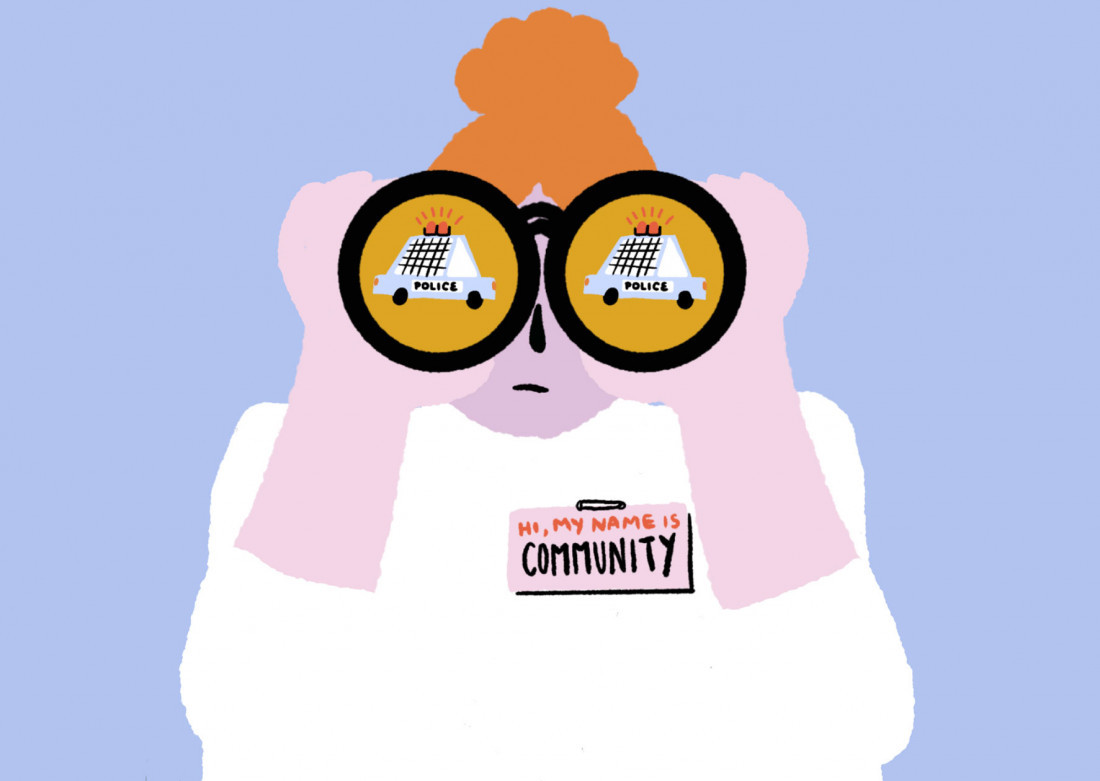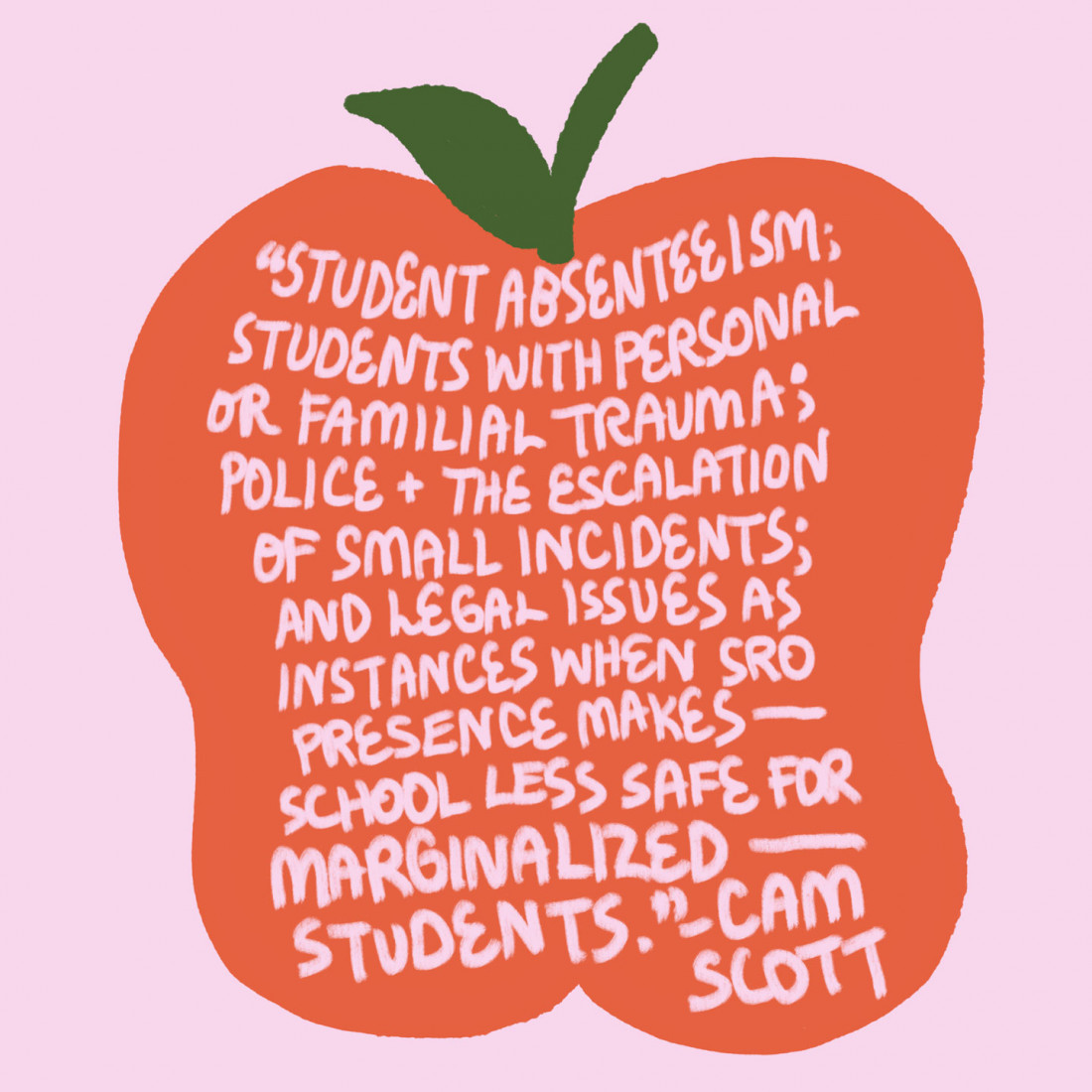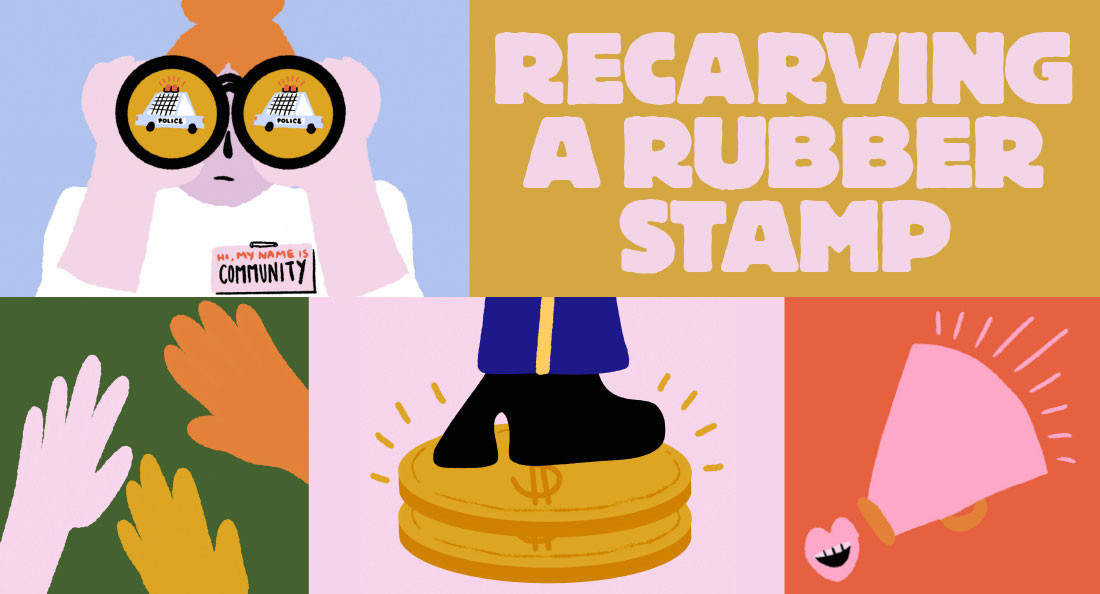Recarving a rubber stamp
The role of the Winnipeg Police Board in the City’s policing
On Sept. 24, the day this paper is being published, Cam Scott is speaking at the third regular meeting of the Winnipeg Police Board (WPB) in 2020. Scott is an organizer with Police-Free Schools Winnipeg (PFSW), a campaign to defund the School Resource Officer (SRO) program. SROs are police officers who work in schools.
“We’re navigating the city infrastructure for the first time with this campaign. For us, the (WPB) is a little untested,” Scott says.
He explains he doesn’t have any specific expectations regarding the result of the meeting.
“We’ve decided to take the WPB at its word, as it claims to be a vehicle of accountability and oversight and to reflect the needs and values of Winnipeggers to the police,” Scott says.

The board’s role
Every province has a police act mandating oversight of police. That act is supposed to have a public reporting function and manage the relationship between the police, the government of their jurisdiction and the public. Manitoba’s is called the Police Services Act.
In accordance with the act, the NDP government led by Greg Selinger created the WPB in the wake of two high-profile deaths at the hands of WPS officers in 2005: that of Crystal Taman, who was killed in a car crash by an off-duty WPS officer, and that of Mathew Dumas, who was shot and killed by a WPS officer. The WPB held its first meeting in 2013.
Kevin Walby, an associate professor of criminal justice at the University of Winnipeg, says, in practice, the efficacy of police boards varies.
It depends on “whether the city has other ideas about how to provide community safety and on the Police Services Act and provincial police commission,” Walby says.
In the context of the greater public conversations happening in response to the deaths of Black people at the hands of police, Walby says the problems with the whole police board structure fall into the following broad categories: failure to provide accountability, failure to provide and respond to public input and failure to manage the police budget.

Accountability
Michelle Hudson, cousin of Eishia Hudson, says city hall and Mayor Brian Bowman have been very quiet about holding the officers involved with Eishia’s death and the deaths of Jason Collins and Stewart Kevin Andrews accountable.
Eishia was killed by police on April 8, 2020. An investigation from the Independent Investigations Unit of Manitoba (IIU) is ongoing at the time of this article’s publication.
“They have not spoken publicly or offered guidance into seeking justice. In fact, there have been only a few politicians who have spoken up about this. They are Leah Gazan and Wab Kinew,” she says.
“To me, justice looks like convicting all the police involved and holding them fully accountable for not only killing Eishia, but for everyone else they killed; releasing the names of the cops involved and changing the system overall so that fatalities and abuse of power is no longer tolerated within policing here,” she says. “I don’t want to see anyone else get killed or injured very badly by police, especially not another youth.”
When it comes to enforcing police accountability, there are hard limits to the WPB’s power, even though they are mandated to provide civilian governance and oversight to the WPS.
The WPB can hire and fire the police chief and approve the police budget, but they are limited in their ability to hold police accountable, Daniel Friesen, an organizer with Winnipeg Police Cause Harm (WPCH), says.
“Further, the mayor appoints five of the members that sit on the (WPB). As we saw recently with the stepping down of Coun. Vivian Santos, the (WPS) also basically have a veto to who sits on the (WPB),” he says.
Santos was unanimously appointed to the WPB earlier this year. Shortly after publicly criticizing the size of the budget allocated to the police, the WPS claimed she failed the security check required for joining the WPB. Someone within the WPS leaked details to Global News that there were allegedly ties between Santos and someone who had allegedly trafficked drugs. Santos could not be reached for comment.
When it comes to accountability, Walby says, “the WPB has no powers to intervene when WPS is withholding files from the (IIU). It has no power to intervene when WPS are trying to scuttle or submerge or destroy records. It has no power to intervene when it’s discovered other kinds of malpractice within the (WPS).”
Hudson doesn’t have high hopes for justice from bodies like the WPB, given how much information about Eishia’s death has been withheld.
“This city is horribly racist. I think only so many people can give the right feedback, while others sit back and turn a blind eye to what’s going on,” she says.
PFSW has been cautious of engaging with the WPB, because when the board does talk about accountability, it tends to not have positive results.
“We have serious reservations about the board's ability and will to make police accountable to communities," Scott says.
Friesen is clear that giving the WPB additional powers will not correlate with a safer Winnipeg for groups being overpoliced.
“The way to reduce police violence is not to just have more oversight over the police, it’s to reduce the number of police,” he says. “Even if the (WPB) has more oversight capacity, the police are still empowered to harass and murder people, and their budget still takes away resources from communities they go into and criminalize.”

Who has a voice?
Friesen says WPCH continues to speak at WPB meetings, because it is one of the very few public, official channels to raise dissent against the WPS.
“Engaging (the WPB) intervenes in the rubber-stamping process, even if the (WPB) doesn’t have the authority to intervene in police operations on a day-to-day basis,” he says.
Walby says that with three to four meetings held per year and minimal public engagement attempts, the WPB meetings are held in difficult-to-access offices and enforce limits on speaker time.
These meetings provide “the most minimal structure for public input possible,” Walby says.
Coun. Markus Chambers, who has expressed interest in increasing social services rather than police presence to address issues like homelessness and drug use, was recently appointed chair of the WPB. Walby is skeptical his addition has impacted the priorities of the board.
“The conversations are still around increasing training, increasing access to technology. They’re not really acknowledging the arguments of the defund movement,” Walby says.
While the PFSW campaign is community-based and aimed at trustees and councillors rather than the WPB, part of the campaign responds to claims the WPB has made about the SRO program as a positive method of community development in the report on the Environment for Policing.
Scott says the methodological approach undertaken in the report is seriously flawed, and that SRO presence is the cause of many of the problems the program claims to address.
“A report saying ‘a majority of people feel safe around police’ is effectively meaningless. Police need to be assessed with the impact on marginalized communities they profile and actively harm,” he says.
Scott cites student absenteeism; students with personal or familial trauma; police and the escalation of small incidents; and legal issues as instances when SRO presence makes school less safe for marginalized students.

Budget control
PFSW may not initially seem closely linked to the police budget, but in addition to the negative effect SROs have on students, Scott notes the campaign has a place in the greater divestment conversation.
“We don’t believe public schools should be a tool for police to deepen their involvement in the communities they harm, and we also don’t think public schools should foot any part of the bill of what is essentially an image-repair campaign on behalf of a violent and unwieldy and overfunded institution,” he says.
“There are 18 SROs. Compared to how enormously bloated the (WPS) is, it’s not an enormous program,” Scott says. “One of the things we’re doing with this campaign is a preliminary gesture towards a broader reinvestment in the social good and a divestment of policing.”
Walby says the WPB rarely looks closely at the budget, nor do they micromanage it.
“If (the WPB) did, they would maybe see different kinds of misspending and slush funds,” he says. “I and (University of Winnipeg assistant professor) Bronwyn Dobchuck-Land examined the police budget, and we flagged all kinds of slush funds and cost overruns in that budget, but the (WPB) doesn’t do that the way the city does with other budgets.”
Where does the board go from here?
Coun. Chambers says one of the first things he did as chair of the WPB was send a letter to the justice minister, requesting police boards in Manitoba have a greater role in reviewing the Police Services Act, calling on additional bureaucratic tools to intervene on budget and set strategic priorities for police forces.
He believes the WPB will be more receptive and responsive to input from the public.
“This iteration of the (WPB) is having those collaborative discussions on how we can improve upon aligning services that better serve the needs of our community,” Chambers says.
Chambers says “there are certainly concerns of a systemic nature” regarding the over-policing of BIPOC, specifically Black and Indigenous people, by the police.
“We have to hear the concerns of the community, and we have to see how police are responding to that,” he says.
With police getting 26.6 per cent of the 2020 city budget, Friesen says the (WPB) has no ability to control them, and the IIU has no history or interest in disciplining officers.
“We really need to start thinking about what is really going to make our communities safer, going to help make Winnipeg a better place, because clearly what we’re very invested in is not working.”

Published in Volume 75, Number 03 of The Uniter (September 24, 2020)







